Taking care of our skin is a crucial part of our overall health and well-being. Our skin acts as a barrier against the external environment and protects us from harmful elements like pollution, dirt, and UV rays. As a result, a proper cleansing routine is essential to remove impurities and prevent damage to our skin. However, many of us are unaware of the common face washing mistakes we make that can harm our skin's health and appearance. In this article, we'll discuss the top five face washing faux pas and provide tips on how to avoid them for a flawless cleanse. Whether you're dealing with dry, oily, or sensitive skin, these tips will help you achieve a healthy, glowing complexion and protect your skin from damage caused by external factors. So let's dive in and explore the dos and don'ts of face washing for flawless, healthy skin.
Identifying Common Face Washing Mistakes
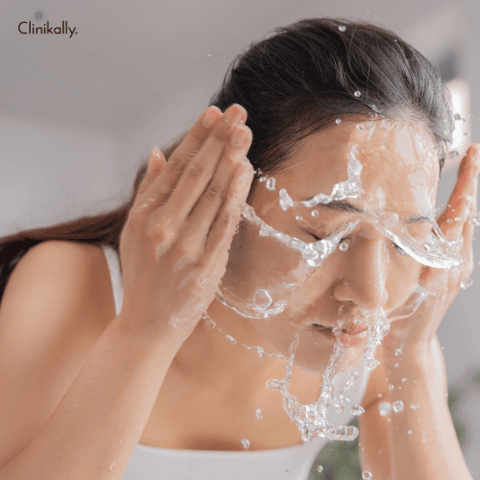
When it comes to achieving healthy, glowing skin, proper face washing techniques are essential. Unfortunately, many people are unknowingly making mistakes that can lead to skin irritation, breakouts, and other issues. In this section, we'll discuss some of the most common face washing mistakes and how to avoid them.
Harsh Cleansers and Over-Exfoliation
Using harsh cleansers or over-exfoliating can strip the skin of its natural oils, leading to dryness, irritation, and even breakouts. While exfoliation can help slough off dead skin cells, too much of it can disrupt the skin's natural barrier and cause inflammation. To avoid these issues, look for gentle, non-abrasive exfoliators, and use them no more than once or twice a week. Additionally, opt for gentle, pH-balanced cleansers that won't strip the skin of its natural oils.
Inappropriate Water Temperature and Cleansing Frequency
The temperature of the water you use to cleanse your face is also essential. Using water that is too hot or cold can cause damage to the skin, while cleansing too frequently can lead to over-drying and irritation. It's essential to find the right balance and use lukewarm water to avoid disrupting the skin's pH balance. Additionally, aim to cleanse your face no more than twice a day, and avoid over-cleansing or scrubbing too hard.
By avoiding these common face washing mistakes, you can help maintain healthy, glowing skin that looks and feels its best. Incorporate gentle techniques and targeted products into your routine, and be mindful of the frequency and temperature of your cleansing routine. With a little care and attention, you can achieve the beautiful, healthy skin you've always wanted.
The Importance of Gentle Cleansing Techniques
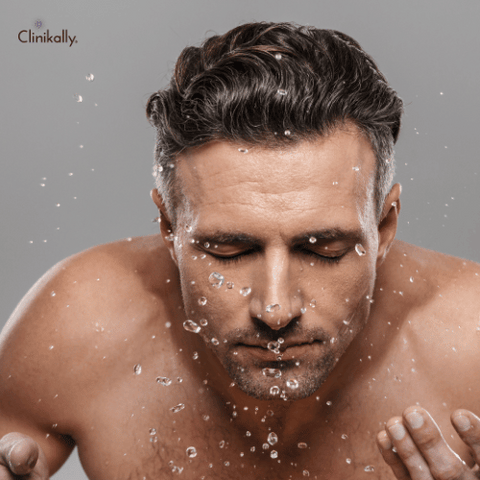
Cleansing is an essential part of any skincare routine, and using gentle techniques is crucial for maintaining healthy, glowing skin. Unfortunately, many people are unaware of the importance of gentle cleansing techniques and unknowingly cause damage to their skin. In this section, we'll explore why gentle cleansing is essential, and how to incorporate gentle techniques into your cleansing routine. By avoiding harsh products and techniques and using gentle, targeted products, you can promote a brighter, more even complexion while protecting and nourishing your skin.
Selecting the Right Cleanser for Your Skin Type
One of the most crucial steps in any cleansing routine is selecting the right cleanser for your skin type. Using a cleanser that is too harsh or not suited to your skin's needs can cause irritation and breakouts. For example, those with oily skin should look for a cleanser that helps control excess oil production, while those with dry skin should opt for a more hydrating cleanser.
Proper Facial Massage and Makeup Removal
Proper facial massage techniques can help increase blood flow and lymphatic drainage, resulting in a brighter, more even complexion. When removing makeup, it's important to be gentle and use a gentle cleanser to avoid tugging or pulling at the skin. Using a gentle eye makeup remover can also help avoid irritation or damage to the delicate eye area.
Preserving Your Skin's Natural Barrier
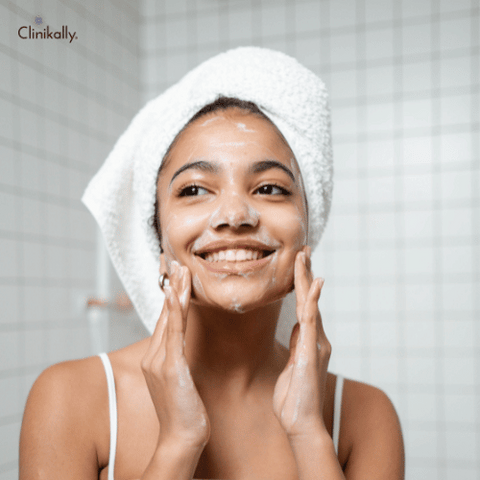
The skin's natural barrier is a complex system of lipids, proteins, and oils that help protect against external factors such as pollution, UV rays, and bacteria. It also helps lock in moisture, keeping the skin hydrated and healthy. To maintain this barrier, it's important to avoid practices that can damage it, such as excessive towel drying and rubbing.
Avoiding Excessive Towel Drying and Rubbing
After cleansing, it's common to use a towel to dry the skin. However, excessive rubbing or pulling at the skin can cause damage to the skin's natural barrier. Instead, gently pat the skin dry using a soft towel or a cotton t-shirt. This will help avoid friction and protect the skin's natural oils.
Hydration and Moisturization Post-Cleansing
After cleansing, it's crucial to hydrate and moisturize the skin to maintain its health and appearance. This is especially important if you have dry or sensitive skin, as these skin types are more prone to dehydration. Look for a lightweight, non-comedogenic moisturizer that won't clog pores. Additionally, incorporating a hydrating serum or essence into your routine can help plump up the skin and provide additional moisture.
If you have oily skin, you may be hesitant to use moisturizer, thinking it will make your skin more oily. However, even oily skin types need hydration to maintain their health and balance. Look for a lightweight, oil-free moisturizer that won't clog pores and help regulate excess oil production.
Overall, preserving your skin's natural barrier and promoting hydration and moisturization post-cleansing are essential for maintaining healthy, glowing skin. By avoiding excessive towel drying and rubbing and incorporating the right moisturizing products into your routine, you can help keep your skin healthy and balanced.
Customizing Your Cleansing Routine for Your Skin Concerns

Not all skin is created equal, and different skin types have unique needs when it comes to cleansing. Whether you have sensitive, dry, oily, or acne-prone skin, customizing your cleansing routine is crucial to achieve optimal results. In this section, we'll explore how to tailor your cleansing routine to address specific skin concerns. By selecting the right cleanser, using appropriate techniques, and incorporating targeted products, you can help maintain healthy, glowing skin that looks and feels its best.
Addressing Sensitive and Acne-Prone Skin
Sensitive skin requires extra care when it comes to cleansing. Look for gentle, fragrance-free cleansers that won't irritate the skin. Avoid using hot water and opt for lukewarm instead. It's also important to avoid over-exfoliating, as sensitive skin can easily become irritated.
Acne-prone skin also requires a specific approach to cleansing. Look for a cleanser that contains salicylic acid or benzoyl peroxide to help unclog pores and prevent breakouts. Be gentle when massaging the skin and avoid over-exfoliating.
Cleansing Tips for Dry and Oily Skin Types
Dry skin requires a hydrating cleanser that won't strip the skin of its natural oils. Look for a creamy or oil-based cleanser that will provide moisture while still removing impurities. Avoid using hot water, as it can further dehydrate the skin.
Oily skin types should look for a cleanser that helps control excess oil production. Look for a foaming or gel-based cleanser that contains ingredients such as salicylic acid or tea tree oil to help unclog pores and control oil. It's also important to avoid over-cleansing, as it can strip the skin of its natural oils and cause further oil production.
The Impact of Proper Cleansing on Skin Health and Appearance
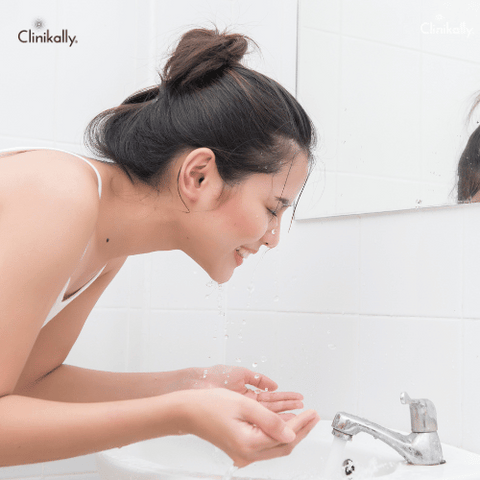
Proper cleansing techniques can have a significant impact on the overall health and appearance of your skin. By removing impurities and excess oil, you can help prevent breakouts and promote a brighter, more even complexion. Additionally, by using gentle cleansing techniques, you can avoid damaging the skin's natural barrier and promote hydration and moisture retention.
The Benefits of a Flawless Cleansing Routine
A flawless cleansing routine can help keep your skin healthy and glowing. By removing impurities, excess oil, and makeup, you can help prevent breakouts and promote a more even complexion. Additionally, by incorporating gentle cleansing techniques and selecting the right cleanser for your skin type, you can avoid damaging the skin's natural barrier and promote hydration and moisture retention.
Seeking Expert Advice on Skincare Habits and Techniques
If you're unsure about the best skincare habits and techniques for your skin type, it's always a good idea to seek expert advice. Dermatologists can provide valuable insight into your skin's needs and recommend products and techniques that are tailored to your specific concerns.
Embracing a Holistic Approach to Face Washing and Skin Care
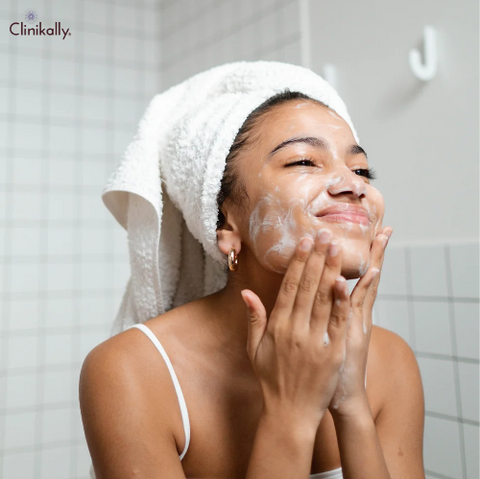
Lastly, it's important to remember that proper face washing and skincare habits are just one part of a holistic approach to skin health. Eating a balanced diet, staying hydrated, and getting enough sleep can also play a significant role in maintaining healthy, glowing skin.
In conclusion, proper cleansing techniques are essential for maintaining healthy, glowing skin. By avoiding common face washing mistakes and incorporating gentle techniques and products, you can help promote a brighter, more even complexion while avoiding damage to the skin's natural barrier. Remember to select the right cleanser for your skin type, be gentle when massaging the skin, and seek expert advice when necessary. By embracing a holistic approach to skincare, you can help promote healthy, glowing skin for years to come.








































